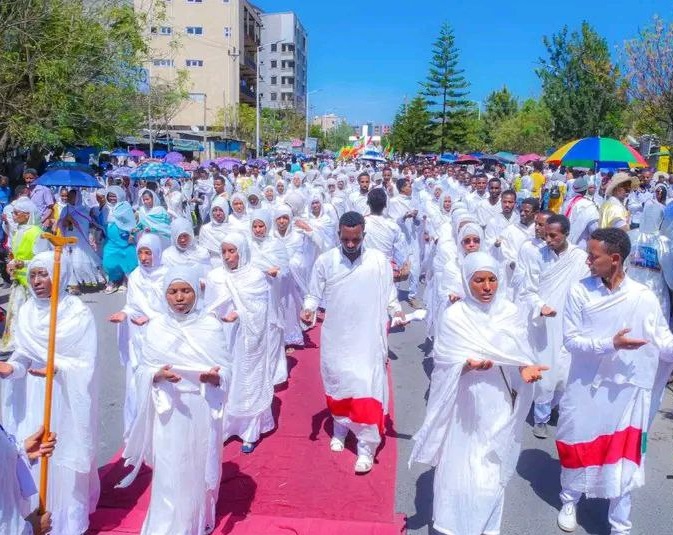Celebrating the World’s Spectacular Festival—Ethiopian Timket - ENA English
Celebrating the World’s Spectacular Festival—Ethiopian Timket

Addis Ababa, January 18, 2025 (ENA)—Frequently, various festivals in Ethiopia attract numerous tourists in this month of January. The most popular holiday throughout the country that is celebrated in this month is Timket (Epiphany).
Ethiopian Timket is truly one of the most spectacular religious festivals in the world.
As Timket is one of the largest outdoor celebrations, this festival marks the baptism of Jesus Christ in River Jordan.
The Ethiopian epiphany, which is largely considered as one of the country’s highly rated public events, tourists every year extremely express their enchantment to the unique experience of this blissful holiday.
During the celebration of this UNESCO-inscribed intangible world’s heritage, Ethiopian Christians embrace with a mass baptism at different waterfronts or sacred pools around the country. That makes tourists abroad who attend the celebration of Timket every year, to be enthralled by its unique religious and cultural dimensions.
Lalibela, Gondar, and Addis Ababa are the top spots of Epiphany.
Key Venues to Celebrate Ethiopian Timket!
While celebrated throughout Ethiopia, Jan Meda in Addis Ababa and the historic city of Gondar are extremely top stops for the commemoration of Timket (Epiphany).
Jan Meda in Addis Ababa
Referred to as the capital of Africa, a buzzing hub of diplomats and home to such notable offices as AU and UNECA, Addis Ababa is the best place to celebrate Ethiopian Epiphany.
Timket celebration in Addis Ababa is of deservedly colorful and full of actions. On the eve of Timket, known as Ketera, the actual celebrations begin with a procession to Jan Meda, a sporting field and celebration quarter for Timket for over a century. This time deacons and priests who are wearing colorful satin clothes sing hymn songs. Young and old people, most of whom dress up in national costumes, also sing, clap and dance giving thanks to their God.
The boo-boom and tim-tim sounds of a big drum being beaten by a priest, who is performing ritual dancing in the middle of the field, also give a special color to the event.
With these full activities, Jan Meda explodes with the excitement of the mass for two days celebrations that it is hard to miss the festival.
Besides, Timket festival, the Ethiopian Epiphany, is also celebrated in more than 80 sites in almost sub-cities including Jan-Meda, a large public gathering site in capital Addis Ababa.
Like many open-door festivals including Meskel, the finding of the True Cross, Timket is also attended by many tourists and other foreigners who happen to be in Ethiopia.
What happens at Timket Festival?
Timket (Epiphany) is a three-day ceremony that starts on the 18th and runs on to the 20th of January which is dedicated to the Feast of St. Michael (Kana Zegelila). Every year on the eve of Timkat 18 January, commonly known as Kettera, the Tabot the replica of the Ark of the Covenant is taken out from every church with awe-inspiring processions.
Then wrapped in rich clothes and fine silks and borne in procession on the head of the priest.
The celebration starts from the eve by accompanying the tabots with great solemnity to the baptismal water (rivers). Millions of people, mainly the faithful, Ethiopian diaspora living abroad and tourists, and citizens from the rest of Africa celebrate the feasts by attending in the places where the ceremony is held.
Timket is both a public and private affair. On the festival, Ethiopians entirely wear white traditional outfits during the festival, draped with a traditional Netela, or shawl and gather at the waterfront at dawn to watch the water be blessed by the priest. On the way to the churches, the clergy (priests) perform religious dancing and performance known as “shibsheba” in selected destinations.
Most importantly, Timket is also a time for reconciliation. At this time, community members settle old disputes, reflecting the festival’s deeper spiritual meanings beyond the colorful processions. This special aspect of Timket highlights the integral role of forgiveness and peace in the community’s ethos.
In general, the Ethiopian Epiphany is an aesthetically beautiful event to witness, a very spiritual one to take part in and an ancient tradition that is an honour to share.